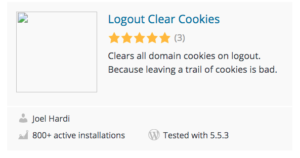Disclosure: This post contains affiliate links. I may receive compensation when you click on links to products in this post. For an explanation of my Advertising Policy, visit this page. Thanks for reading!
WordPress disable cookies options.
First thing you should know is that if you have a free WordPress.com website you will be unable to disable cookies in it. Why?
Because WordPress.com will show ads that require cookies. The only way to disable cookies and anything related to them on your WordPress.com website would be to upgrade to one of their paid plans.
If you upgrade to one of WordPress.com’s paid hosting plans you could disable all the cookies you like and have full control and autonomy over your WordPress website.
Although disabling all the cookies on your website is neither advised or most likely impossible without changing the coding in your PHP files or at the server level.
Even at those levels there is still an ongoing debate as to which method is most effective.
Let’s go a little deeper into the world of cookies and WordPress and maybe you as a non-coder can find just the solution you’re looking for without going to such extremes, especially if you don’t have to.
How do I know if my WordPress site uses cookies?
You can usually do this in your browser. If you’re using Chrome, simply visit your website in Chrome.
Then, at the far left of your URL, if you have HTTPS, click that icon.
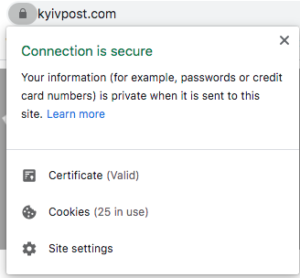
A box will pop up. Go down to “cookies” and click that.
In the next box you will see cookies and use. These are the cookies that are currently coming from your website.
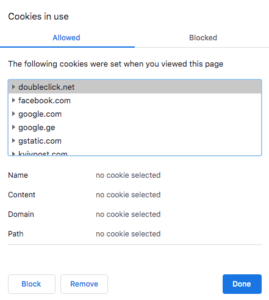
There are little triangles on the left of each cookie and you could find out what each cookie is for.
You also have the choice to block cookies as well.
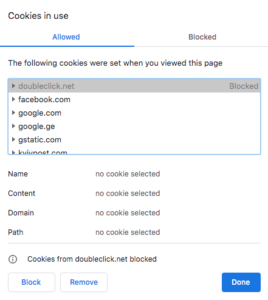
Does WordPress delete cookies on logout?
WordPress, by default, does not delete cookies on logout. Some cookies in fact, can follow your site’s visitors all around the internet.
That’s what many of them have been designed to do. Especially, if you are using plugins by third parties among others.
However, you can install a WordPress plugin that will delete cookies on logout.
Here is of them that you can use:
How do I get rid of cookies on WordPress?
This is a bit of a controversial question.
First, you should not want to get rid of all the cookies you have on your WordPress site.
Some of them are quite vital to not only the functionality of your WordPress website, but enhance the user experience as well.
By deleting some of these cookies you may actually be hurting your site more than helping it.
There are a few ways to possibly and permanently get rid of cookies on WordPress.
However, this would require you or a developer to go directly into the code of your WordPress website and add some additional code which could get rid of the cookies on your WordPress website.
You can also, or you may need to go into your websites server files and add code in the appropriate files. This may require htaccess.
There are a few places where I found possible coding solutions and I will give you the following links if you are interested in doing it yourself.
These two are from Stack Overflow:
- “how to delete all cookies of my website in php“
- “Clearing cookies used by before and after wordpress plugin“
Here is one from Stack Exchange:
However, be forewarned, unless you are very familiar with PHP code and or accessing your server files, these possible solutions might be not only unnecessary, but even harmful to your WordPress website.
What happens if you don’t accept cookies on your site?
If you don’t accept cookies on your site, you may be harming the user experience for the visitors to your WordPress website.
Many of the functions, plugins and other attributes of your WordPress website rely heavily on cookies.
These cookies remember things like JavaScript as well as login information, usernames etc which makes it easy for your visitors to access certain parts of your website that you actually want them to visit and engage with.
By deleting some cookies with your plugins you will be making this much more difficult for your visitors to leave comments or other functions you want to encourage on your website.
Remember, the more hoops a visitor needs to jump through in order to engage with your website, the more likely they are to leave and visit your one of your competitors.
Do I need cookie consent on my WordPress website?
If you’re setting up a WordPress website without any user related plugins, then most likely you do not need a cookie consent form.
However, if you are using third-party plugins that do attach to users visiting your website for example, if you’re using Google analytics, Ad-networks and or affiliate websites, then to be GDPR and CCPA compliant, you would need a cookie consent policy and/or form on your WordPress website.
How do you add consent to a cookie on WordPress?
There are various WordPress plugins now that you can use that will help your site become GDPR as well as CCPA cookie compliant on WordPress.
Here are a few you should check out:
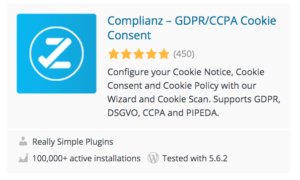 |
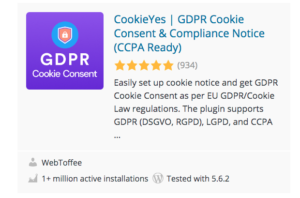 |
I actually prefer the “CookieYes” plugin myself.
You can usually use the free version of these plugins if you are just operating 1 or 2 websites and be compliant.
However, as with most WordPress plugins, they will also have a paid version.
You should at least look into their paid versions to see if perhaps your particular website or websites may need more protection as well as a more flexible and efficient cookie consent process.
There are so many GDPR and CCPA cookie consent plugins, just click on the preceding link for more.
Is there a WordPress clear cookies plugin?
It seems like there’s a WordPress plugin for everything. And why not? WordPress has well over 55,000 plugins and counting.
Plugins are being developed as well as discontinued everyday.
However, with the exception of the “Logout Clear Cookies” plugin above, I could not find a single plugin that could clear all the cookies on a WordPress site.
This is why those determined enough to want to clear all cookies on their WordPress website usually will change something within the code or server files of their WordPress website or hire a developer to write it for them.
Can WordPress set cookie limits?
The only way WordPress can set cookie limits is usually in the login section of your website.
Cookies are usually used to store username and password information, sometimes up to a period of two weeks or even more.
You can change this and set cookie limits for your WordPress login, but only at the PHP code level of your WordPress website or through your server files.
However, you should know that every website is different. Themes are coded slightly differently from one another as well as server plans and hosting companies in regards to access and how much access they will give you to their server where your website is hosted on.
Some changes can be done through htaccess files in cPanel, if you are on shared hosting.
Anyway, if you are interested in the coding solutions check out these articles from some well known WordPress developer forums like Stack Overflow, GitHub and Stack Exchange.
You should be warned however, that unless you are knowledgeable about PHP and you know your theme very well and/or you are knowledgeable on how to access your server properly in order to make the necessary changes, then you’re better off either hiring a developer to do so or try to limit the cookie durations or cookies in general, from a plugins level.
WordPress disable cookies options, summary.
As you can see, disabling cookies on a WordPress website is trickier than you might think.
Although I have found some possible solutions in order to totally disable cookies on your WordPress website, they require coding experience and/or server access. And even these possible coding solutions might not work for your particular theme or your hosting situation.
Therefore, you are better off approaching your WordPress disable cookie options from a plugins level.
You could either limit the amount of plugins that you use on your WordPress website in order to limit cookie exposure to your users as well as yourself. Or you can use the appropriate safeguards and consent forms that will keep your WordPress website legally compliant to GDPR and CCPA standards.
Either way, cookies do have their place on the web, especially in WordPress, as they can and do, in most cases, enhance your visitors user experience more than detract from it.
I don’t know about you, but whenever I come up against a cookie consent form which is preventing me from experiencing the website I wish to visit and use fully, I mindlessly just click accept all cookies and get on with it.
Admittedly, perhaps this isn’t the best way to use the internet, but if I do it, I’m sure the majority of others do the same thing.
However, it’s good to know that I do have an option to consent or not consent to the use of cookies and the gathering of information. Protecting users’ privacy as well as webmasters privacy is all a good thing in the end.


